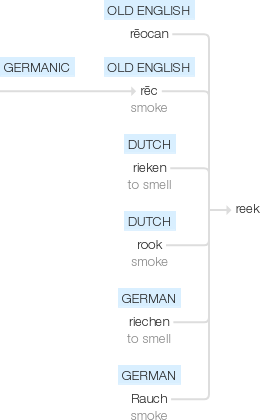Reek
Old English rēocan ‘give out smoke or vapour’, rēc (noun) ‘smoke’, of Germanic origin; related to Dutch rieken ‘to smell’, rook ‘smoke’, German riechen ‘to smell’, Rauch ‘smoke’.
wiktionary
From Middle English rek, reke(“smoke”), from Old English rēc, rīec, from Proto-West Germanic *rauki, from Proto-Germanic *raukiz (compare West Frisian reek, riik, Dutch rook, Low German Röök, German Rauch, Danish røg, Norwegian Bokmål røyk), from Proto-Indo-European *rowgi- (compare Lithuanian rū̃kti(“to smoke”), rū̃kas(“smoke, fog”), Albanian regj(“to tan”)). [1]
From Middle English reken(“to smoke”), from Old English rēocan, from Proto-Germanic *reukaną (compare Dutch ruiken, Low German rüken, German riechen, Danish ryge, Swedish ryka), from Proto-Indo-European *rougi-. See above.
Probably a transferred use (after Irish cruach(“stack (of corn), pile, mountain, hill”)) of a variant of rick, with which it is cognate.
etymonline
reek (n.)
Middle English reke "smoke, fumes; steam, vapor," from Old English rec (Anglian), riec (West Saxon), "smoke from burning material," probably from a Scandinavian source such as Old Norse reykr, Danish rǿg, Swedish rök "smoke, steam."
These are reconstructed to be from Proto-Germanic *raukiz (source also of Old Frisian rek, Middle Dutch rooc, Old High German rouh, German Rauch, Icelandic reykr "smoke, steam"), from PIE *reug- "to vomit, belch;" also "smoke, cloud."
The sense of "stench" is attested 1650s via the notion of "that which rises" (compare reek (v.)). Century Dictionary (1891) marks the word "Obsolete, archaic, or Scotch." According to OED, "As the word has chiefly survived in northern use the palatalized form reech is comparatively rare." A c. 1250 document refers to the period March-April as Reke-fille "the misty month."
reek (v.)
Middle English reken "to emit smoke," of smoke or stench, "to rise," from Old English recan (Anglian), reocan (West Saxon) "emit smoke," from Proto-Germanic *reukan (source also of Old Frisian reka "smoke," Middle Dutch roken, Dutch rieken "to smoke," Old High German riohhan "to smoke, steam," German rauchen "to smoke," riechen "to smell"); from the same source as the nouns (see reek (n.)).
Originally a strong verb, with past tense reac, past participle gereocen, but occasionally showing weak conjugation in Old English. Meaning "to emit a bad smell" is recorded from 1710 via sense "be heated and perspiring" (early 15c.). Related: Reeked; reeking.
